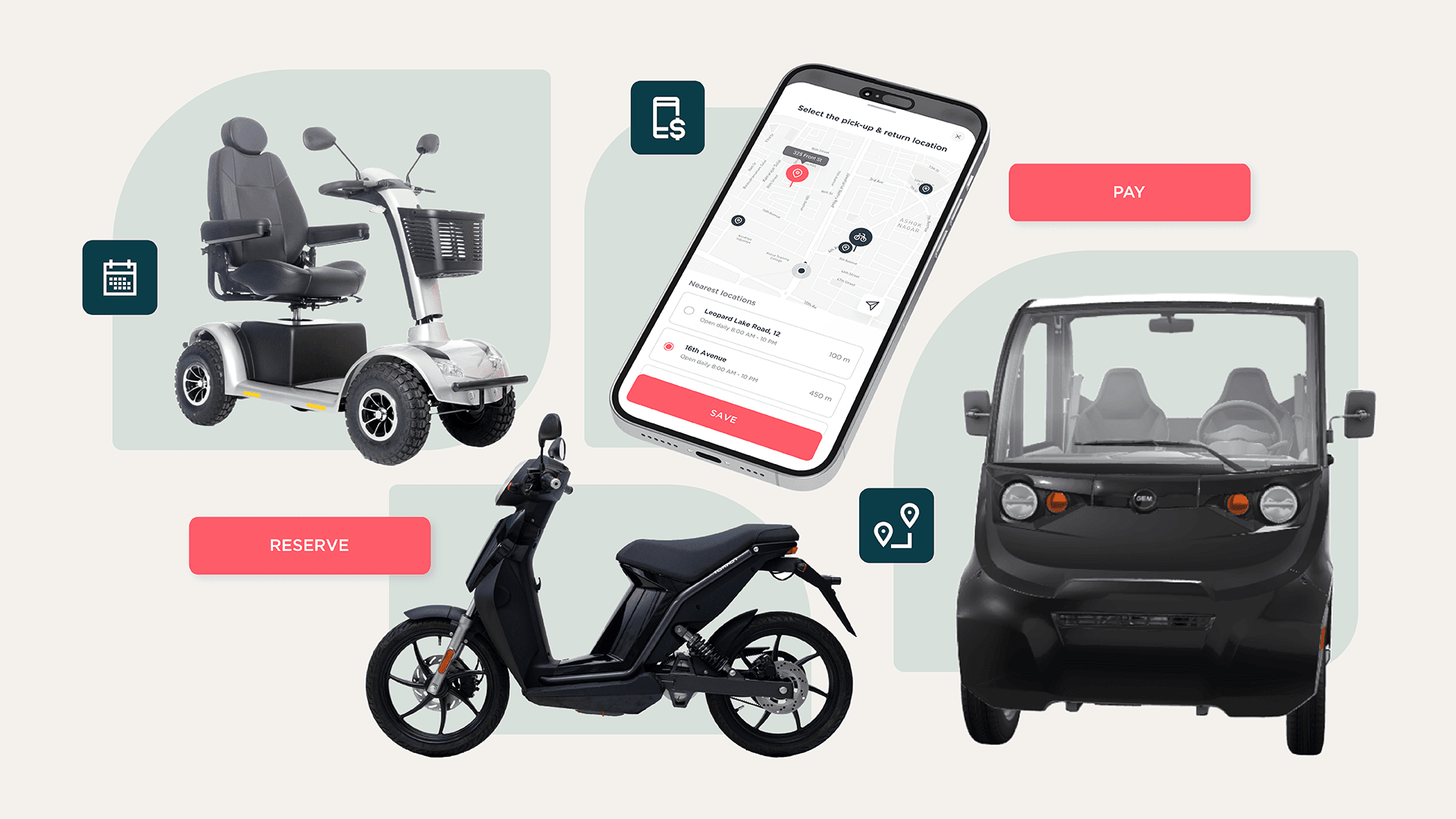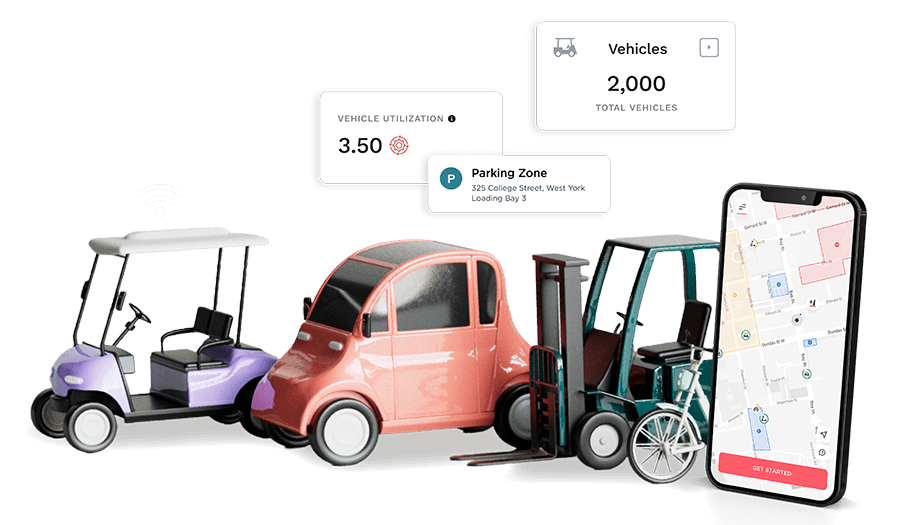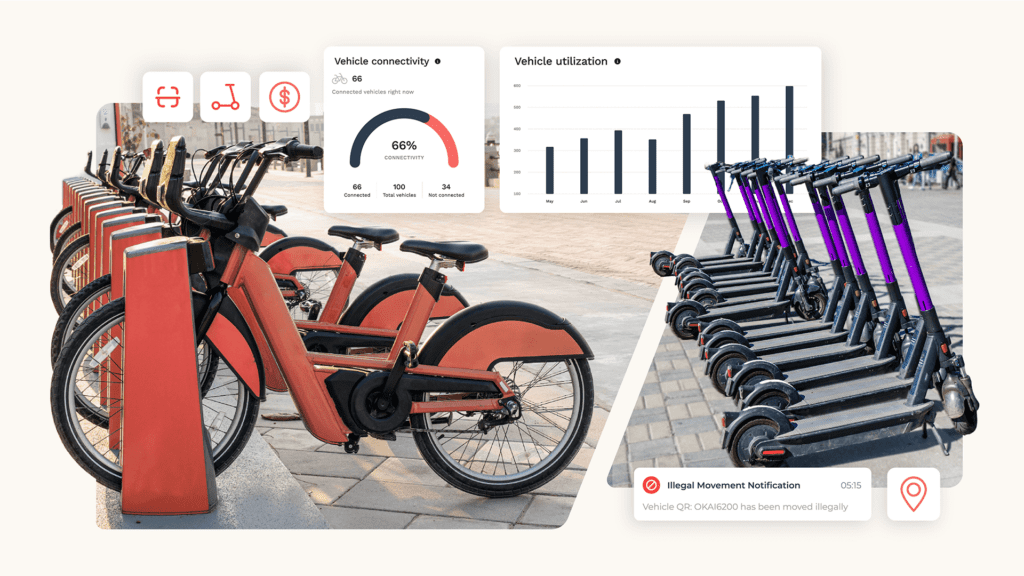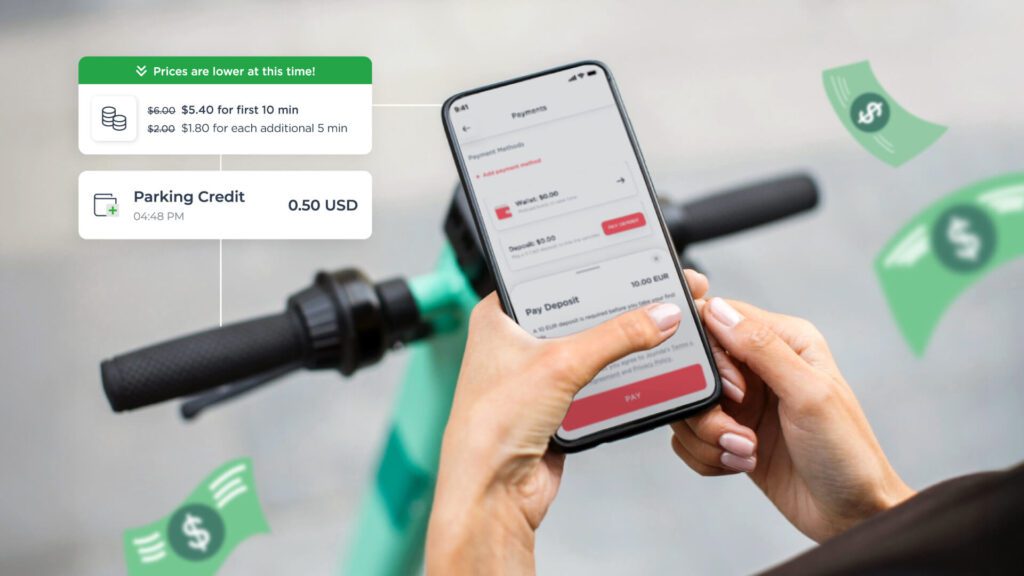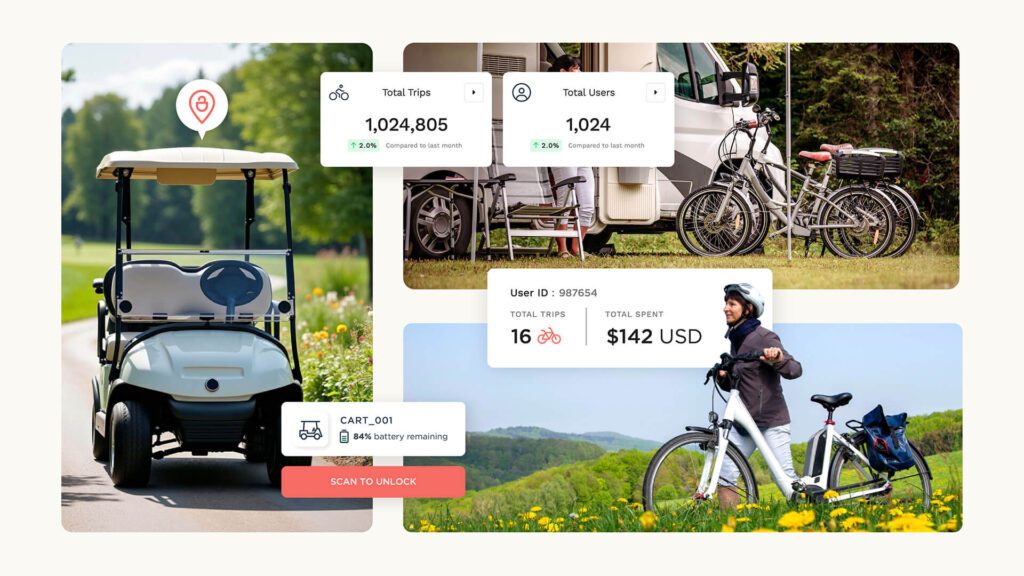Joyride has been at the forefront of powering electric vehicle systems since 2014, which means we’ve seen our share of shared mobility. Our software solutions extend far beyond two-wheelers, from managing and tracking shared paddle boats and snowmobiles, to cargo trikes and quad-cycles.
More recently, we’ve seen 3 emerging vehicle rental models present lucrative business opportunities: the increasing popularity of mobility scooters, the electrification of mopeds and the growing demand for mini electric vehicles (EVs).
Let’s explore how these trends translate into tangible business opportunities and how Joyride’s software solutions can empower entrepreneurs to capitalize on the changing landscape of urban transportation.
1. Medical / Mobility Scooter Rentals
Four-wheeler low-speed mobility scooters are gaining popularity as a practical solution for short-distance travel amongst individuals with mobility challenges. Whether this difficulty comes from age, disability, or injury is irrelevant–what’s important is that mobility is a human right with direct impact on quality of life.
Since the average cost of a mobility scooter is between $2,000 and $4,000, individuals with temporary mobility limitations (such as an injury) are unlikely to purchase a personal device. For others, the upfront purchase cost might be completely prohibitive, forcing the individual to rely on publicly provided wheelchairs and accessible infrastructure.
This presents entrepreneurs with numerous openings to tap into a growing market segment– all while providing an essential service to communities with diverse mobility needs. For example, fleet owners can collaborate with malls, amusement parks and tourist attractions to offer mobility scooter rental services. With Joyride’s white-label software powering your vehicles, guests can easily pre-book and pay for their rental ahead of time, or simply scan the scooter’s QR code to rent a vehicle on-site.
Short term rentals such as this helps customers with mobility challenges to navigate crowded urban areas and have full access to widespread amusements that otherwise would be inaccessible. Given the logistical challenges of transporting a bulky mobility scooter, even individuals who own a private scooter may have need of rental services when travelling further afield.
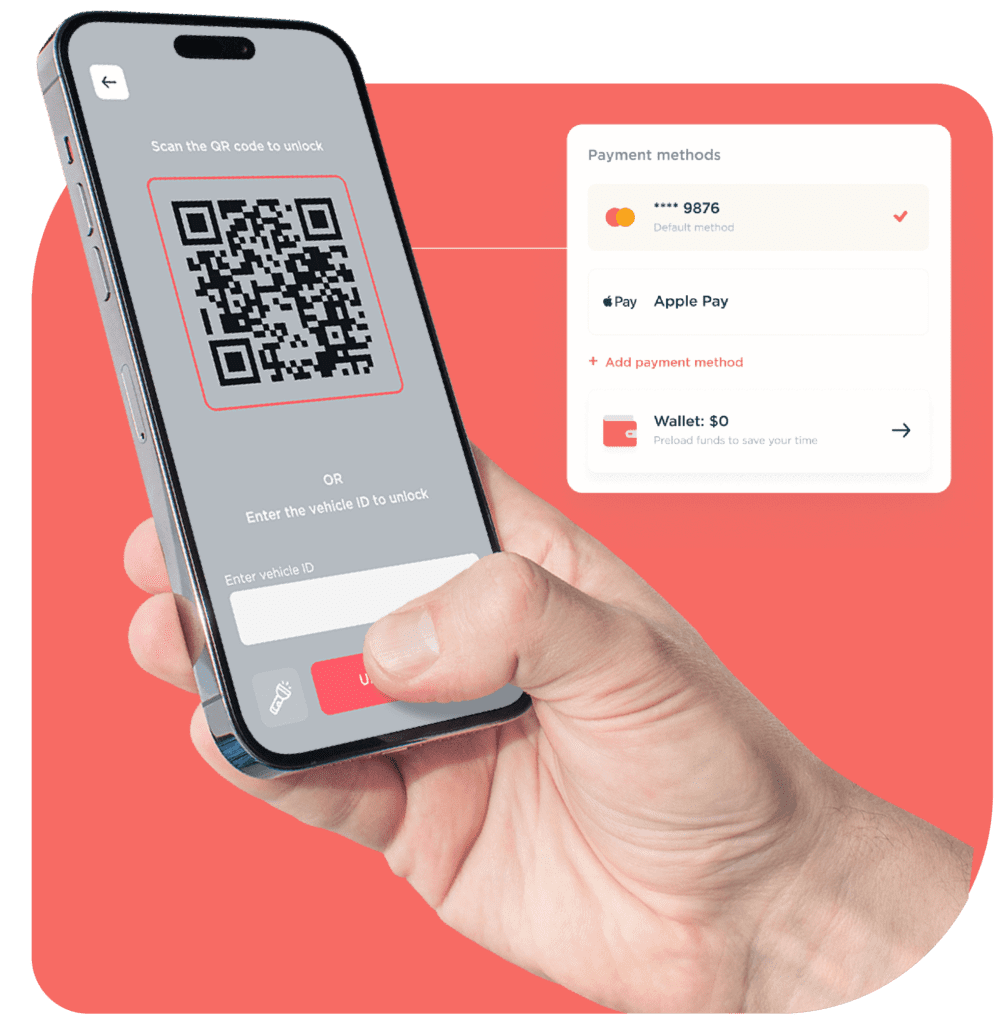
Fleet owners might also consider B2B applications, such as partnering with hospitals and retirement communities to integrate mobility scooter rental stations and charging infrastructure into their amenities. With Joyride software powering your rental fleet, every vehicle is GPS tracked in real-time, and contained within geofence boundaries, ensuring safety for customers and protecting your assets from theft or damage.
2. E-Moped Rentals
Mopeds have long been a staple of urban transportation in countries such as China, Vietnam and India due to their relatively low cost, compact size and agility. Electric mopeds in particular are an attractive alternative to car ownership. And with Battery as a Service (BaaS) subscription services like Gogoro growing in popularity, charging wait times and range anxiety are a concern of the past.
Private vehicle rental models are certainly a good business opportunity, but the real power of electric mopeds lies in last-mile delivery space.
With the rise of e-commerce and on-demand logistics, businesses are seeking efficient ways to fulfill orders and navigate congested city streets. Electric mopeds are an environmentally friendly solution for local deliveries, enabling merchants to meet customer demands while minimizing their carbon footprint.
For entrepreneurs eyeing the electric moped rental market, strategic partnerships with local restaurants and retailers can unlock tremendous potential.
For example, businesses with seasonal demand fluctuations may need extra vehicles to accommodate increased order volume.
By leveraging Joyride’s fleet management software, fleet owners can easily divide their assets into an unlimited number of private business fleets–and automatically bill based on hourly, daily, or monthly rental periods.
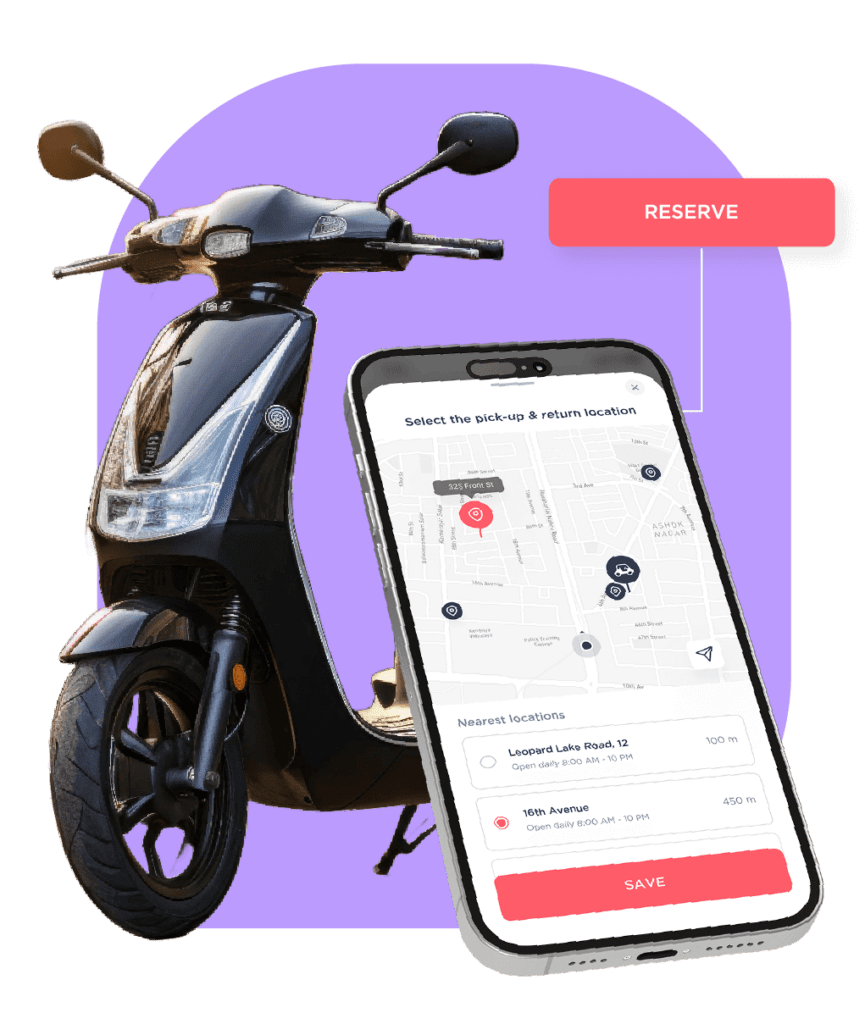
Alternatively, electric mopeds can be rented out to contract workers of third-party delivery (3PD) services. Companies like Whizz and Zoomo are already tapping into this market with e-bikes. In order to build brand loyalty, it’s essential to accommodate the dynamic nature of gig economy work. With the Joyride platform, fleet owners can offer multiple rental options such as block pricing, monthly subscriptions, or long-term leasing. This kind of flexible vehicle access empowers gig workers to scale their usage according to their working hours and optimize their earnings potential.
With a robust set of software features such as remote vehicle diagnostics, automated booking requests, and secure payment processing, it’s never been easier to drive change in the delivery space.
ON DEMAND WEBINAR
New Mobility Rental Models
If you’re wondering what it’ll take to navigate the next era of mobility, then this webinar is for you. Watch the recording of our discussion with EAV and Today, to learn even more about even more opportunities in shared mobility.
3. Mini EV Rentals
At long last, mini cars are hitting the mainstream. No, not the Mini Cooper made by BMW (though the electric model is charming). The term ‘Mini EV,’ also known as minimobility, refers to compact low-speed electric vehicles built for short-distance transportation.
A mini EV has enclosed sides, making it more practical for all-seasons as well as use in colder climates. Equipped with passenger seating, 25-50+ miles of battery range, and more power under the hood, it’s easy to see why vehicles like the GEMe4 are the rising stars of the new mobility industry.
Like with mobility scooters and e-mopeds, purchasing a mini EV simply isn’t feasible for a lot of people–especially in geographies where charging infrastructure is not readily available. Tack on insurance, maintenance costs, and parking fees in the city, and the cons of ownership start to outweigh the pros.
For entrepreneurs with enough startup capital, operating a small fleet of mini cars can quickly turn into a big business. Short term rental models are best suited for high-density areas where each vehicle is rented by multiple different customers throughout the day. On the other hand, long-term rentals or subscription models may be more lucrative in rural communities where residents require more reliable or extended vehicle access.
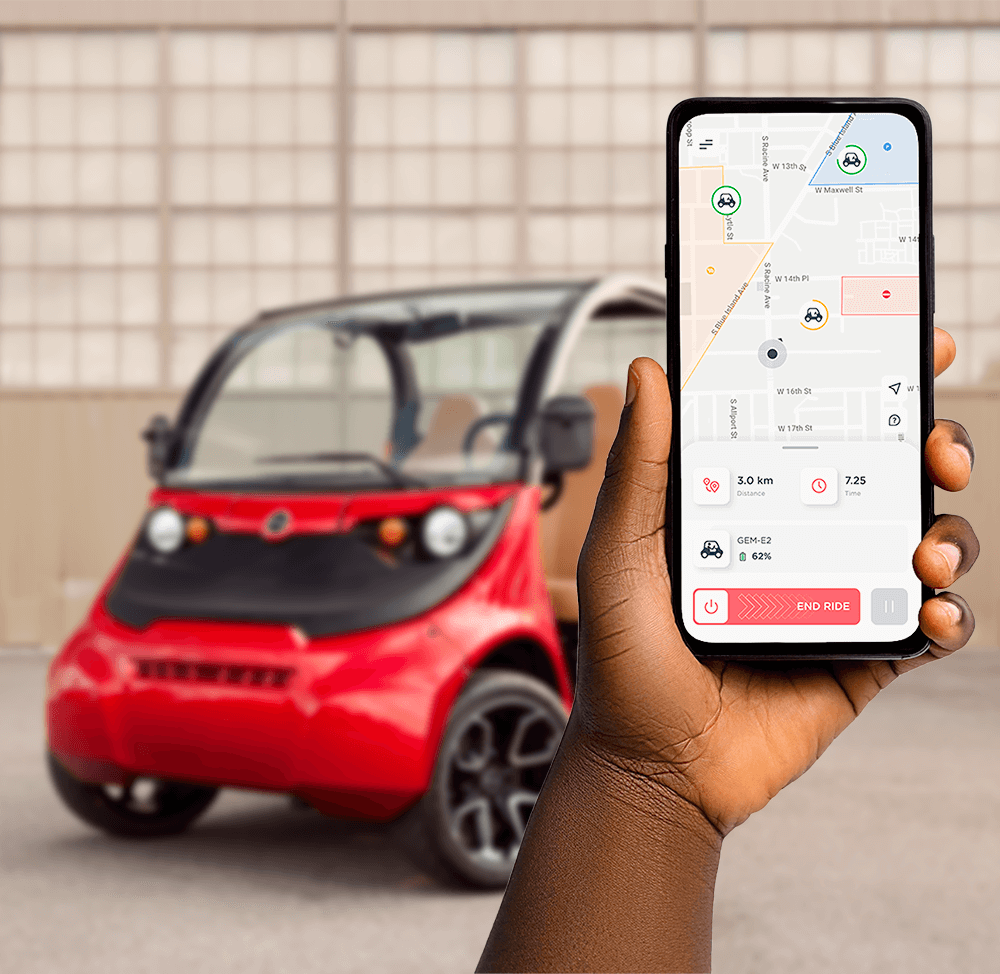
If renting out EVs for grocery runs seems a little far-fetched, the B2B applications of mini mobility might sound more pragmatic. Think corporate car fleets, residential real-estate amenities–even cart rentals on golf courses.
Mini EV fleet owners can leverage the Joyride platform to provide a complete and private rental service for multiple hospitality providers. Say goodbye to paper forms and rental kiosks, and hello to keyless vehicle access with ID verification and safety deposits.
Strategic partnerships with hotels is another great way to tap into an active market without maxing out on customer acquisition cost. Mini EVs can enhance guest experiences in travel and tourism hotspots by providing convenient transportation to explore resort grounds or local attractions.
For those already operating rental fleets with e-bikes, scooters or mopeds, integrating mini EVs is an excellent way to differentiate from competitors, and service a wide spectrum of mobility needs. And since the Joyride platform is multi-modal, any number of vehicle makes, models and modalities can be integrated into a single user-friendly sharing app.
Power any electric vehicle rental model with Joyride
The demand for flexible mobility options is only getting stronger, and with it a whole new realm of rental opportunities. By expanding electric vehicle fleets and investing in charging infrastructure, rental providers can meet the evolving needs of consumers and businesses seeking convenient and eco-conscious transportation solutions.
Even better, rental operators using Joyride’s scalable software platform have the choice to scale their operations and expand their rental fleets to meet evolving market needs, easily onboarding new purpose-built vehicles, expanding into new markets, and diversifying their revenue streams with minimal friction.
Have an idea for a rental scheme but not sure how to connect your fleet? Contact us to find out how your vehicle can be made keyless, connected, shareable and trackable on the Joyride platform.

